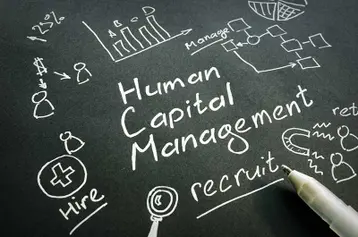Selecting an HCM Software for Your Business

Table of contents
- 1.Benefits of HCM Software
- 2.Improves efficiency to save time and overhead
- 3.Provides data-driven insights for making decisions
- 4.Improves training and development
- 5.Enhances employee engagement to increase productivity and helps to reduce turnover
- 6.Fosters a positive workplace culture
- 7.Promotes team collaboration and employee development
- 8.Manages employee data better
- 9.Offers great insights about your workforce
- 10.Compliance concerns support
- 11.Responds to change
- 12.How to Select HCM Software
- 13.Include key stakeholders
- 14.Define clear objectives and priorities
- 15.Assess current HR technology and processes
- 16.Evaluate integration capabilities
- 17.Look for scalability and customization
- 18.Focus on user experience
- 19.Consider reporting and analytics
- 20.Prioritize data security
- 21.Evaluate vendor reputation and support
- 22.How HCM Software Adds Up
Human capital management (HCM) is a business strategy that considers employees as assets rather than expenses. It requires investing in employees to increase their value to their employers. Human capital management software guides the practice by automating, streamlining, tracking and enhancing the various aspects of an HCM strategy.
Traditional HCM software focuses on automating the core administrative processes of human resources, such as payroll processing and benefits administration. It helps a company run more smoothly and efficiently. HCM software includes these vital core processes but goes further.
Building on the foundation provided by automating HR’s daily operations, HCM helps to maximize the value that employees bring to your business. HCM functions include talent acquisition, talent management, workforce management, employee engagement initiatives and analytics based on employee data.
Benefits of HCM Software
When selecting HCM software for your business, look for technology the provides powerful features. An effective HCM solution automates core HR tasks and optimizes workforce management while supporting employee engagement, productivity and development.
Let’s dive into the benefits of HCM software and see how it can elevate your HR strategy.
Improves efficiency to save time and overhead
HCM software helps to streamline core HR processes such as payroll processing, benefits administraiton, and talent acquisition. Automation helps manage these tasks efficiently and reduces the risk of errors, allowing your HR team to focus on strategic initiatives rather than administrative tasks.
Provides data-driven insights for making decisions
With robust reporting and analytics capabilities, HCM software can help provide your business management with actionable insights into employee performance and workforce trends. This data helps guide strategic decisions related to talent acquisition, workforce optimization and organizational development.
Improves training and development
Human capital management solutions facilitate training and development programs by tracking employee progress and offering customized training resources. This can can help improve employee performance, build stronger career paths and increase workforce happiness.
Enhances employee engagement to increase productivity and helps to reduce turnover
HCM software boosts employee engagement with feedback tools and recognition programs, fostering a sense of value and purpose among your team members. This leads to greater productivity and a reduction in turnover rates.
Fosters a positive workplace culture
Through tools that promote effective communication, HCM software can help you create a positive workplace culture. By recognizing and rewarding employee contributions and facilitating a supportive environment, HCM software contributes to organizational development and higher employee satisfaction.
Promotes team collaboration and employee development
HCM software facilitates team collaboration through integrated platforms and communication tools. By promoting teamwork and providing opportunities for employee development, it enhances performance management and strengthens workplace relationships.
Manages employee data better
HCM solutions offer centralized data management, making it easier to access and update employee records in real-time. This comprehensive approach helps to ensure accurate, up-to-date data handling and streamlines HR operations.
Offers great insights about your workforce
With comprehensive reporting and analytics, HCM software provides valuable insights into workforce trends and challenges. These insights help your organization make informed decisions to improve talent acquisition, employee performance, and compensation and benefits programs.
Compliance concerns support
HCM software includes features that help support certain compliance requirements. The automation checks with up-to-date information to help ensure your organization adheres to certain deadlines. This also saves you time from having to do the research yourself.
Responds to change
As your business evolves, your HCM software should adapt to the relevant needs and trends. The best HCM software solutions offer scalability and flexibility to accommodate changing workforce dynamics and industry demands.
How to Select HCM Software
When selecting the best HCM software for your business, it's best to approach the process thoughtfully and inclusively. In this way, the chosen solution aligns with your organizational goals and workforce needs. Begin by determining who will be part of the decision-making team. This group should represent a diverse range of perspectives and expertise to cover all aspects of the business.
Include key stakeholders
Reach beyond HR management to gather input from other essential stakeholders, such as senior leadership, finance and the IT department. A broad swath ensures a comprehensive understanding of the company's needs and priorities, particularly concerning technology, scalability, cost and user experience.
Define clear objectives and priorities
Before beginning the selection process, outline your key objectives and priorities. Consider the goals for employee engagement, workforce optimization, compliance concerns, and your overall HCM strategy. Define the specific features and capabilities you need, such as talent acquisition tools, employee performance management, compensation and benefits administration and training and development support.
Assess current HR technology and processes
Review your existing HR technology and processes to identify gaps and areas of improvement. This will help pinpoint where a new HCM solution can enhance business efficiency, automation, and reporting.
Evaluate integration capabilities
Consider an HCM software that integrates smoothly with your existing technology ecosystem. Compatibility with other business systems — such as payroll, finance, and other top HR solutions — is essential for efficient data flow and cohesive business management.
Look for scalability and customization
Your HCM software should offer scalability to grow with your business and workforce needs. In addition, consider solutions that provide different service options to help align with your organizational development goals and specific HR processes.
Focus on user experience
Choose an HCM software that is user-friendly and intuitive for your HR team, managers, and employees. A positive user interface contributes to higher adoption rates and smoother implementation. This will help you avoid searching for an HCM software replacement later.
Consider reporting and analytics
HCM software should offer robust reporting and analytics features to provide valuable insights into your workforce. Look for solutions with customizable reporting options to track metrics such as employee engagement, performance management and workplace culture.
Prioritize data security
Given the sensitive nature of HR data, look for HCM software that offers strong data security measures and encryption methods. Ensure the solution adheres to any data protection regulations to which your company may be subject to and to help protect your employee data and safeguard your business.
Evaluate vendor reputation and support
Research the vendor's reputation for customer service, reliability, and support. A reputable provider will offer ongoing assistance, training, and updates to help you maximize the value of your HCM investment.
How HCM Software Adds Up
A good HCM software solution can bring substantial advantages to your business, improving efficiency, automation, and overall management of your workforce. To reap the full benefits, you must invest time in finding the right system for your business needs. By conducting thorough research and weighing the pros and cons of different systems, you can discover a long-term HCM solution for your organization.
When evaluating HCM providers, consider a comprehensive HR platform like the one offered by TriNet. TriNet's full-service HR solution extends beyond the capabilities of typical HCM software, providing you with an all-in-one HR technology platform that helps your business thrive.
Is a TriNet full-service HR solution right for you? We will generate a free personalized business case for outsourcing your HR.
This communication is for informational purposes only, is not legal, tax or accounting advice, and is not an offer to sell, buy or procure insurance.
This post may contain hyperlinks to websites operated by parties other than TriNet. Such hyperlinks are provided for reference only. TriNet does not control such web sites and is not responsible for their content. Inclusion of such hyperlinks on TriNet.com does not necessarily imply any endorsement of the material on such websites or association with their operators.

TriNet Team
Table of contents
- 1.Benefits of HCM Software
- 2.Improves efficiency to save time and overhead
- 3.Provides data-driven insights for making decisions
- 4.Improves training and development
- 5.Enhances employee engagement to increase productivity and helps to reduce turnover
- 6.Fosters a positive workplace culture
- 7.Promotes team collaboration and employee development
- 8.Manages employee data better
- 9.Offers great insights about your workforce
- 10.Compliance concerns support
- 11.Responds to change
- 12.How to Select HCM Software
- 13.Include key stakeholders
- 14.Define clear objectives and priorities
- 15.Assess current HR technology and processes
- 16.Evaluate integration capabilities
- 17.Look for scalability and customization
- 18.Focus on user experience
- 19.Consider reporting and analytics
- 20.Prioritize data security
- 21.Evaluate vendor reputation and support
- 22.How HCM Software Adds Up






